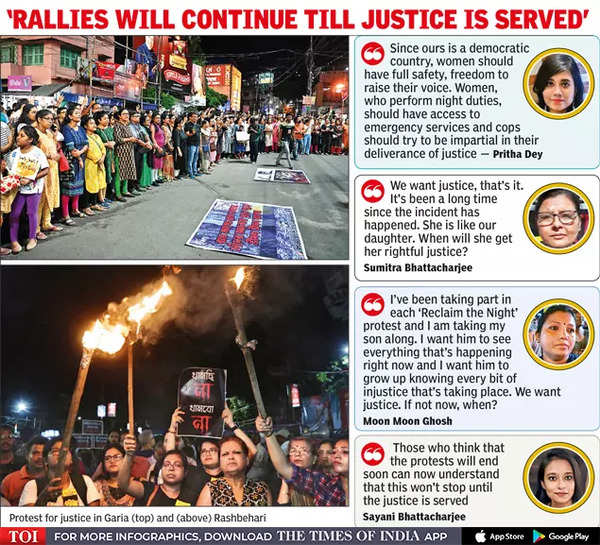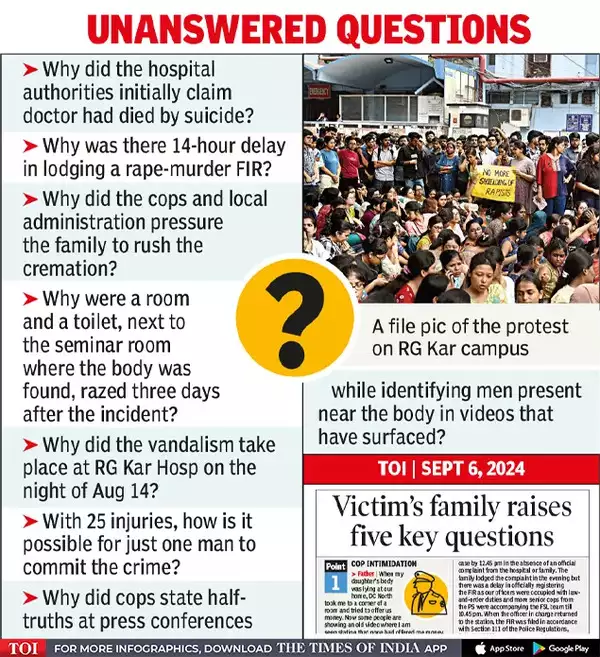The court set a deadline of September 17 for the CBI to submit an updated report. The direction came from a bench headed by Chief Justice DY Chandrachud, who reviewed the status report submitted by Solicitor General Tushar Mehta on behalf of the CBI. The report was submitted in a sealed envelope, indicating the sensitive nature of the investigation.
The court issued the direction that the protesting doctors must return to their duty by 5 pm tomorrow and will not face any consequences if they do so. However, the court warned that non-compliance of this order may result in the state government taking disciplinary action against the absent doctors, as in such a situation the court will be unable to intervene on their behalf.
The bench, which also comprised Justices JB Pardiwala and Manoj Mishra, expressed its objection to interfering in the investigation process. “The CBI has filed a status report, it appears that the investigation is in progress. We direct the CBI to file a fresh status report… We do not want to guide the CBI in its investigation,” the bench said. The bench reaffirmed its stand of allowing the agency to conduct an independent and thorough investigation.
Solicitor General Mehta informed the court that forensic samples from the crime scene would be sent to the All India Institute of Medical Sciences (AIIMS) for further examination.
zoom in
The rape and murder case has rocked Kolkata, leading to protests across the state. On August 9, the victim’s body was found with severe injuries in the seminar hall of the chest department of RG Kar Medical College, a government hospital. The victim, a postgraduate medical student, was brutally attacked, leading to massive public outrage. The next day, Kolkata Police arrested a civic volunteer, but many questioned the police’s handling of the case.
Public anger grew further when it emerged that the Kolkata Police’s initial investigation was delayed and they were also slow to register the incident as an unnatural death. On 22 August, the Supreme Court sharply criticised the Kolkata Police’s apathetic response and described the situation as “extremely disturbing”. The apex court pointed to inconsistencies in police procedural formalities and timelines, raising concerns over the local administration’s ability to deal with such sensitive cases.
The case has also given rise to a wider discussion about the safety and security of healthcare workers, especially women, in public spaces. The Supreme Court had earlier set up a 10-member National Task Force (NTF) to draw up a protocol for the safety of healthcare workers, underlining the importance of ensuring safety in hospital settings. This tragic incident has brought these concerns to the fore, further fuelling demands for systemic reforms in hospitals across the country.
The Big Picture
At the hearing on Monday, West Bengal Government The Supreme Court was told that 23 people have died in hospitals due to the ongoing doctors’ strike to protest against rape and murder. Senior advocate Kapil Sibal, representing the state government, submitted a status report prepared by the state health department, detailing the deaths caused due to disruption in medical services. “The status report has been filed. The state health department has filed a report. 23 people have died due to the doctors’ strike,” Sibal told the bench.
The strike, which began soon after the victim’s body was discovered, has crippled health services in Kolkata. The protesting doctors have demanded justice for their colleague and greater protection for medical personnel. Their demonstrations have increased pressure on the West Bengal government, which is struggling to handle both the consequences of the crime and the ongoing health care crisis.

In view of the strike and security concerns at RG Kar Medical College, the Supreme Court directed a senior official of the West Bengal Home Department and a senior officer of the Central Industrial Security Force (CISF) to ensure that all three companies of the medical college are secure. C.I.S.F. All the policemen deployed in the hospital have been provided with accommodation. Apart from this, the court ordered that all the necessary security equipment be handed over to CISF by the end of the day, so that the security system in the hospital can be further strengthened.
between the lines
The alleged rape and murder of the junior doctor has sparked not just protests by health workers but also a wave of civil unrest across West Bengal. The incident, described as “horrific” by the Supreme Court, has triggered widespread public outrage. Many are angry at what they feel is a cover-up and mishandling of the case by state authorities. This frustration has been compounded by reports of vandalism at the hospital and political interference in the investigation.

Public outrage has grown to include broader issues of women’s safety in both public and private spaces, with protesters demanding systemic changes to protect women from violence and harassment. The protests have been largely led by members of the middle class who feel their concerns have long been ignored by the state government. “The tax incident has wiped out the limited class consciousness of educated civil society, which has now chosen to lead the protests rather than be led by them,” senior journalist Biswajit Bhattacharya told news agency PTI.
What they are saying:
Both observers and participants are seeing the protests as a significant social shift in West Bengal. According to a PTI report, senior journalist Biswajit Bhattacharya said that “the tax incident has erased the limited class consciousness of educated civil society,” empowering them to lead rather than follow the movement. He said the protests are “spontaneous and never seen before,” driven by deep public anger.
Political science professor Maidul Islam described the protests as stemming from a “crisis of representation” and growing disillusionment with political leadership. He explained that public anger has transcended traditional political boundaries, with the middle class uniting behind an issue that is both a demand for justice and a demand for systemic reform.
Islam, however, was cautious in drawing any sweeping conclusions about what this means for the ruling Trinamool Congress (TMC). “I can call this incident the beginning of the end of the middle class’ friendship with the TMC. The rural sector has still not fully caught up with this largely urban sentiment,” he told PTI.
Former civil servant Anita Agnihotri described the protest as a “unique event” and stressed that it was not just about the crime but also about the “appalling manipulation” of the investigation. “This is not just a reaction to the crime, nor is it organised just to raise the issue of women’s safety at workplace. People are shocked and angry that this heinous crime is the possible outcome of a network of crime, extortion and organised racket,” she told PTI.
what will happen next
As the investigation continues, all eyes are on the CBI’s next steps. The Supreme Court’s demand for a fresh status report by September 17 has put additional pressure on the agency to deliver a concrete conclusion. The decision to involve AIIMS for further forensic analysis shows that the CBI is taking a cautious approach to ensure that no loopholes are left in the investigation.
It is becoming difficult for the West Bengal government to handle the situation.
Meanwhile, the protests show no signs of slowing down. What began as a demand for justice for one woman has now turned into a larger movement demanding systemic changes in the way crimes against women are dealt with. Political analysts warn that although the protests are currently being described as “apolitical”, the movement could grow into a political force capable of challenging the state’s status quo.
(with inputs from agencies)
















